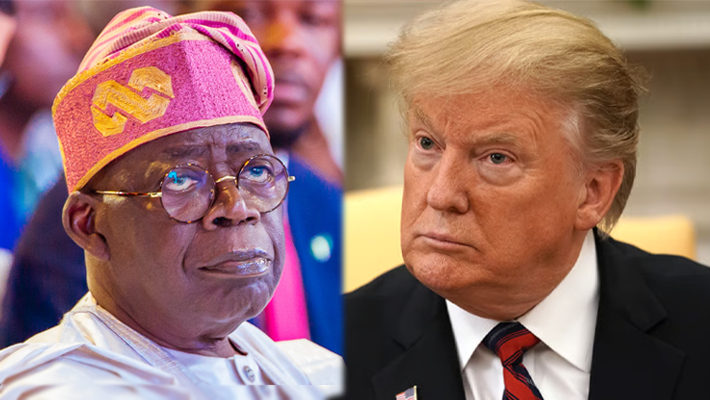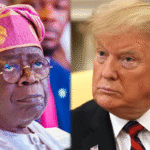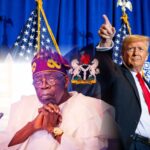Indications emerging on Monday have revealed that the specter of the United States’ action hangs over Nigeria as a bill before the U.S Senate recommended placing the nation back on the Country of Particular Concern (CPC) blacklist.
Pan-Atlantic Kompass reports that this recommendation could purportedly lead to a targeted U.S blacklist on Nigerian officials, including up to 12 Nigerian governors, for allegedly tolerating or overlooking religious freedom violations, particularly against Christians.
The development comes after U.S President Donald Trump announced his decision to redesignate Nigeria as a Country of Particular Concern over alleged persecution of Christians in the country.
Recall Trump, in his first tenure, declared Nigeria a Country of Particular Concern but was immediately overruled by former President Joe Biden after assuming office.
Following the latest designation, Trump has threatened military action in Nigeria and also instructed Secretary of State Marco Rubio to act without delay.
Trump also asked Congressman Riley Moore, together with Chairman Tom Cole and the House Appropriations Committee, to immediately look into the matter and report back to him.
Pan-Atlantic Kompass reports that a bill is already before the U.S Senate.
The bill, titled the Nigeria Religious Freedom Accountability Act of 2025, is sponsored by Republican Senator Ted Cruz.
Cruz, in the bill is calling for the designation of Nigeria as a “Country of Particular Concern” for religious persecution, a development Trump has already announced.
Meanwhile, further look into the bill showed that it also proposed a U.S blacklist and other sanctions against Nigerian public officials and religious authorities accused of allegedly promoting or tolerating violence against Christians and other religious minorities.
The bill, introduced on September 9, 2025, if passed, will mandate the U.S Secretary of State to within 90 days of its passage, submit a report to Congress listing Nigerian officials, including governors, judges, and monarchs who have “promoted, enacted, or maintained blasphemy laws” or “tolerated violence by non-state actors invoking religious justification.”
According to the bill, the sanctions will be implemented under Executive Order 13818, the U.S government’s Global Magnitsky Human Rights Accountability framework.
Pan-Atlantic Kompass also gathered that the U.S blacklist could result in visa bans, asset freezes, and financial restrictions for those found culpable.
Further breakdown of the bill also revealed that it proposed U.S blacklist and sanctions against Nigerian states implementing Sharia laws.
Cruz, in the bill, labelled Sharia law as “blasphemy law”, claiming that the laws are used against Christians in Nigeria.
Pan-Atlantic Kompass reports that Sharia law is derived from Islamic jurisprudence. The law has long existed as a system of regulation among Muslim communities in northern Nigeria.
The major turning point came between 1999 and 2000, shortly after Nigeria’s return to civilian rule, when several northern states, beginning with Zamfara under Governor Ahmad Sani Yerima, expanded Sharia’s jurisdiction to include criminal law and public morality.
Within two years, about 12 northern states had adopted similar Sharia-based penal codes and established parallel Sharia courts alongside existing secular courts.
The affected states include Zamfara, Kano, Sokoto, Katsina, Bauchi, Borno, Jigawa, Kebbi, Yobe, Kaduna, Niger, and Gombe.
However, Kwara, Kogi, Plateau, Benue, Nasarawa, Taraba, and Adamawa, though with significant Muslim populations, still operate under the conventional secular legal system, with Sharia limited only to personal status matters such as marriage, inheritance, and family issues for Muslims, rather than criminal or public law.
Recall also that the Sharia Council announced moves to establish its presence in parts of Southern Nigeria, beginning with Oyo and Ogun states, but pulled back following outrage in Southwest Nigeria.
Defending the bill on the floor of the Senate, Cruz claimed that Nigeria’s leadership had “institutionalised sharia law and enabled jihadist violence.”
He continued: “Religious persecution and violence against Christians and other religious minorities in Nigeria is endemic.
“Since 2009, over 52,000 Christians have been murdered, 20,000 churches and faith institutions destroyed, and dozens of villages wiped out. The federal and state governments have failed to act, and in many cases, they are complicit.”
The bill underscores that since the adoption of sharia law in Zamfara State in 2000, during the administration of former President Olusegun Obasanjo, nearly all 19 northern states had adopted blasphemy provisions in their legal codes.
Pan-Atlantic Kompass reports that the Sultan of Sokoto, Alhaji Sa’ad Abubakar, has been called out by a former U.S. mayor, Mike Arnold, over the alleged persecution of Christians in Nigeria.
Arnold accused the Monarch, who is also considered the spiritual leader of Nigeria’s Muslims, of allegedly failing to use his influence to halt jihadist violence in northern Nigeria.
In an open letter circulated on X, Arnold questioned the Sultan’s past role as Nigeria’s Defence Attaché in Pakistan, drawing a link between his service years and the later spread of jihadist tactics in northern Nigeria.
The Sultan had served as Nigeria’s Defence Attaché to Pakistan from 2003 until his ascension to the throne in 2006. During this time, he was also accredited to Iraq, Saudi Arabia, and Afghanistan.
In his post, Arnold queried, “How do you explain that the tactics of global jihadist groups, previously unseen in Nigeria, began in your caliphate after your return from Pakistan? Where are the fatwas against these killings? What have you done to protect your citizens and subjects?”
However, the Nigerian government has explained its position on the implementation of Sharia law in the country.
In an official policy note titled “Nigeria’s Constitutional Commitment to Religious Freedom and Rule of Law,” published by the Ministry of Foreign Affairs, the government explained that the country’s constitutional and judicial systems fully protected freedom of religion.
According to the statement, Nigeria remains a constitutional, multi-religious democracy” whose 1999 Constitution, as amended, forbids adoption of a state religion (Section 10), guarantees freedom of thought, conscience and religion (Section 38), and prohibits discrimination on grounds including religion (Section 42).
“Sharia in Nigeria is not a nationwide, compulsory system,” the document clarified.
“Certain northern states have enacted Sharia-based criminal provisions that apply only to persons who profess Islam; non-Muslims are not subject to those provisions.
“In civil or personal matters, such as marriage or inheritance, recourse to Sharia is elective, just as parties may choose customary or statutory regimes,” it added.
The Federal Government further emphasised that there was no federal offence of blasphemy in Nigerian law.
It added that national criminal statutes only addressed public-order breaches or acts likely to provoke violence, which are “religion-neutral” and apply equally to all faiths.
“The government of Nigeria does not persecute Christians, in law or policy.
“Nigeria’s legal order protects all faiths equally; Christians freely build and register churches, run schools and charities, and hold public office across the Federation,” the statement read.
It reiterated that Sharia’s scope was constitutionally limited and optional.
“In civil matters, Sharia Courts of Appeal at the state and federal levels have jurisdiction only over Islamic personal law, and parties voluntarily elect this system through their marital or contractual choices.
“In criminal matters, only a handful of northern states have adopted Sharia-based codes, and jurisdiction remains confined strictly to Muslims. Non-Muslims cannot be tried under those laws.
“Even where a first-instance Sharia court enters a conviction, constitutional due-process standards, such as fair hearing, legal representation, and proof standards, apply.
“Secular appellate courts have repeatedly set aside or remitted convictions where procedures or rights were deficient. Sharia adjudication is bounded by the constitution, not above it.
“Nothing in Nigeria’s Constitution, Criminal Code, or Penal Code authorises persecution of Christians or adherents of any religion,” it said.





